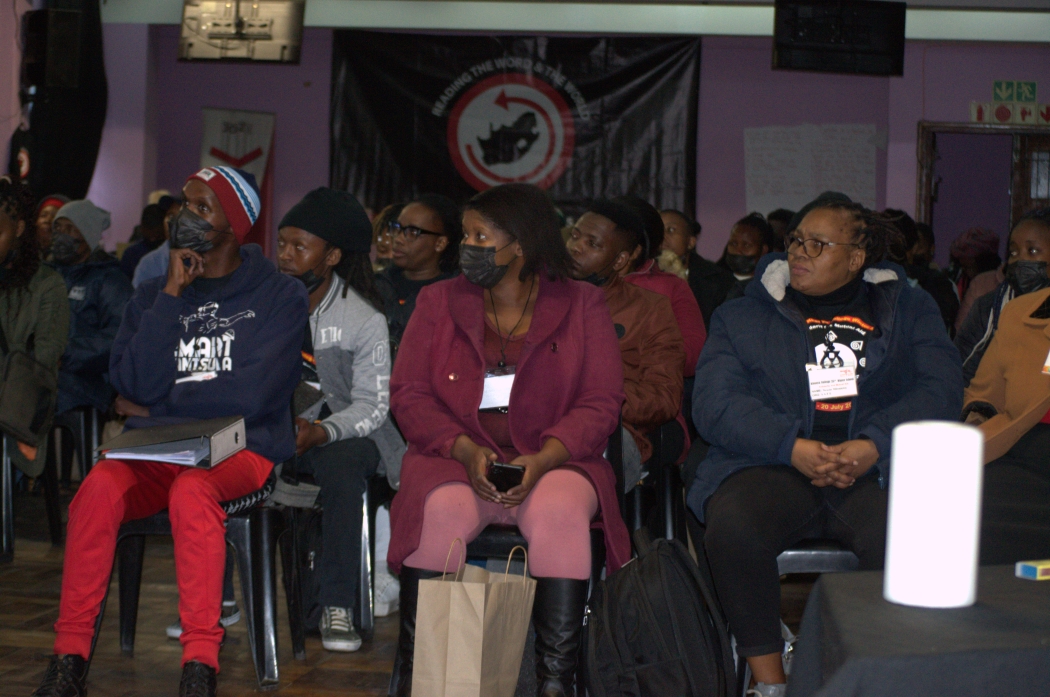16 July 2024 marked the second day of the 2024 winter school which started on a high note with comrades singing and chanting liberation songs. The first session delved into the concept of mutual aid and its significant role in movement building and encouraging solidarity in communities. The Winter school’s participants formed groups and read Mutual Aid: Building Solidarity during this Crisis (and the Next) by Dean Spade. Spade describes mutual aid as a collective plan to meet each other’s needs during crises and struggles in our communities.
The text describes mutual aid projects as interventions to meet survival needs and build shared understanding about why people do not have what they need highlighting how capitalism prioritises profits over people’s wellbeing. Spade uses the United States of America’s Black Panther Party’s survival programs, which ran throughout the 1960s and 1970s, they had a free breakfast program, free ambulance, medical clinics, a service offering rides to elderly people doing errands, and a school aimed at providing a strict liberation curriculum to children.
These programs welcomed people into the liberation struggle by creating spaces where people could get basic needs whilst building a shared understanding about the conditions they were facing in communities. For years, people have worked together to survive crises throughout history. In South Africa for example, mutual aid has historical roots influenced by practices such as Ubuntu and the liberation struggles against apartheid. After reading the text participants commonly understood that working class communities still use mutual aid initiatives to resolve social issues collectively, these projects include stokvels, burial societies, community gardens, and reading clubs.
During the second session, Dr Sathasivan Cooper (74) took centre stage to emphasise the important role played by the Black Consciousness movement as a mutual aid response. The Black Consciousness activist said, “We gave up on community agency”. This is because community members have become individuals who care only for themselves. Social movements are also an example of mutual aid initiatives, these initiatives make significant contributions to community support and social change. Cooper spoke about the need for community members to gather and talk about what affects them. He said mutual aid projects are spaces where people realise they have common experiences, questions or issues they may want clarities on. He also said that communities were no longer as they were during the heydays of Black Consciousness and that people are consumed by individualism.
The participants, mostly young women activists discussed how essential mutual aid is in movement building, as it encourages and supports women’s participation in communities to expand solidarity on women’s issues and fighting patriarchy. Other participants shared how the projects they have been involved in, at their organisation encourage free participation and they all collectively address the needs of people rather than waiting for state assistance or funding. Cooper told the winter school participants that many times working class people in South Africa do not actively fight to change their conditions but await the coming of a messiah or another big strong man to save them. “Salvation can only happen if we equip ourselves with the right to demand….”, so spoke Cooper, saying people should stand up for their rights. Mandlenkosi Gcwabaza from Sakha Ubuntu organisation shared that, “within social movements, mutual aid can be seen in [the] way activists provide educational resources and support the vulnerable, making sure that everyone has access to opportunities”.
Mzwandile Mokhuane from Abahlali Base Freedom Park noted that, “mutual aid is a collective action of different people to reach one positive and common goal, he also acknowledged that it is important to embark on mutual aid projects because it brings about collection participation of people to advance the struggle of struggling communities especially in informal settlements”. One of the strongest points Cooper made was about the artificial and social barriers, he noted language as a basis for closing people out of aid “you are not a language… Language is only something that we speak.” He continued saying people should not define themselves using things like language, skin colour, or religion to create barriers for other community members, especially when people need to benefit from mutual aid initiatives during crises.
Noluthando Xaba from Imbumba added, “Mutual Aid is democratic agreement amongst people who are going through the same struggle as they work together to overcome those problems. The shared responses from participating activists and Cooper highlights the importance of working together to create crisis-resilient communities and the ability to provide immediate support to one another while advocating for long-term change. By doing so, communities and organisations can create a society where everyone could thrive in collective care.
This article was submitted as part of the Imbila Yesu publication produced daily for the duration of the Winter School in 2024 (14-20 July 2024). It appeared in Edition 1, released on 15 July 2024. You may republish this article, so long as you credit the author and Karibu! Online (www.Karibu.org.za), and do not change the text. Please include a link back to the original article.


 Download PDF
Download PDF